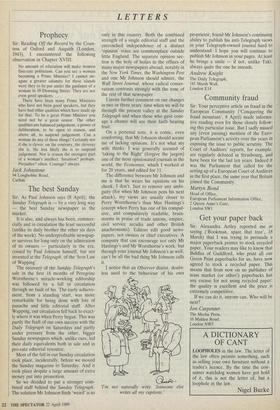The best Sunday
Sir: As Paul Johnson says (8 April), the Sunday Telegraph is — by a very long way — the best Sunday newspaper in the market.
It is also, and always has been, commer- cially and in circulation the least successful (unlike its daily brother the other six days of the week). No underprofitable newspap- er survives for long only on the admiration of its owners — particularly in the era, coined by Paul Johnson himself, but not invented at the Telegraph, of the 'Iron Law of Wapping'.
The recovery of the Sunday Telegraph's sale in the first 18 months of Peregrine Worsthorne's miracle-working editorship was followed by a fall in circulation through no fault of his. The early achieve- ment, from a standing start, was more remarkable for being done with lots of panache and little editorial staff. After Wapping, our circulation fell back to exact- ly where it was when Perry began. This was partly the fault of our own success with the Daily Telegraph on Saturdays and partly under pressure from the other, bigger Sunday newspapers which, unlike ours, led their daily equivalents both in sale and in pro-rata editorial resource.
Most of the fall in our Sunday circulation took place, incidentally, before we moved the Sunday magazine to Saturday. And it took place despite a large amount of extra money put into promotion.
So we decided to put a stronger com- bined staff behind the Sunday Telegraph. The solution Mr Johnson finds 'weird' is so only in this country. Both the combined strength of a single editorial staff and the entrenched independence of a distinct 'opinion' voice are commonplace outside little England. The separate opinion sec- tion is the holy of holies in the offices of many major newspapers abroad, notably in the New York Times, the Washington Post and one Mr Johnson should admire, the Wall Street Journal, whose radical conser- vatism contrasts strongly with the tone of the rest of that newspaper.
I invite further comment on our changes in two or three years' time when we will be through the present valley at the Sunday Telegraph and when those who gave cour- age a chance will see their faith bearing fruit.
On a personal note, it is comic, even comforting, that Mr Johnson should accuse me of lacking opinions. It's not what my wife thinks. I was generally accused of 'taking to the Right' (forgive the jargon) one of the most opinionated journals in the world, the Economist, which I worked at for 20 years, and edited for 11.
The difference between Mr Johnson and me is that he wears his opinions on his cheek, I don't. Just to remove any ambi- guity (for when Mr Johnson pens his next attack), my views are usually closer to Perry Worsthorne's than Max Hastings's (except when Perry has one of his compul- sive, and compulsively readable, brain- storms in praise of trade unions, empire, civil service arcadia and other British anachronisms). Editors edit good news- papers, not owners or chief executives. A company that can encourage not only Mr Hastings's and Mr Worsthorne's work, but through your journal Mr Johnson's as well, can't be all the bad thing Mr Johnson calls it.
I notice that an Observer diarist, doubt- less used to the behaviour of his own 'I'm not naturally witty. Someone else writes all my captions.'
proprietor, found Mr Johnson's continuing ability to publish his anti-Telegraph views in your Telegraph-owned journal hard to understand. I hope you will continue to publish Mr Johnson in your pages. At least he brings a smile — if not, unlike Taki, always quite the one he intends.
Andrew Knight
The Daily Telegraph, 181 Marsh Wall, London E14


































































 Previous page
Previous page